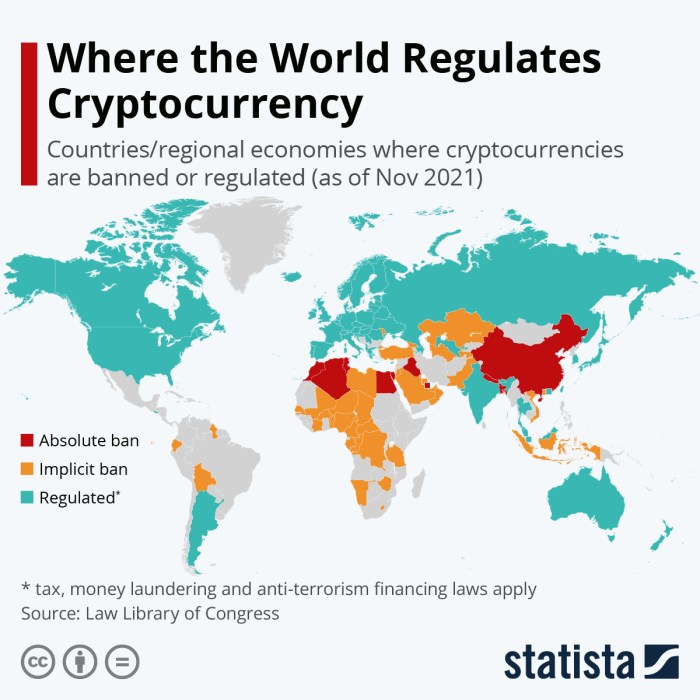Delving into Crypto regulations by country, this introduction immerses readers in a unique and compelling narrative, with a focus on the current state of cryptocurrency regulations globally. From key differences in regulatory approaches to the impact on the crypto market, this overview sets the stage for a detailed exploration of crypto regulations around the world.
As we dive deeper into major countries like the United States, European Union, Japan, and China, analyzing their regulatory frameworks and recent updates, the complexities and challenges faced by governments in regulating cryptocurrencies become more apparent. Stay tuned to uncover emerging trends that are shaping the future of crypto regulation and its impact on global adoption.
Overview of Crypto Regulations by Country

Cryptocurrency regulations vary widely across the globe, with some countries embracing digital assets while others impose strict restrictions. The regulatory landscape plays a crucial role in shaping the growth and adoption of cryptocurrencies.
Key Differences in Regulatory Approaches
- Some countries like Japan and Switzerland have established clear guidelines for cryptocurrency exchanges, promoting innovation while ensuring consumer protection.
- In contrast, countries like China have taken a more stringent approach, banning initial coin offerings (ICOs) and cracking down on crypto trading activities.
- The United States has a patchwork of regulations at the federal and state levels, leading to regulatory uncertainty for businesses operating in the crypto space.
Impact on the Crypto Market
- Uncertain or restrictive regulations can hinder investment and innovation in the crypto market, leading to market volatility and reduced liquidity.
- Countries with clear and supportive regulatory frameworks tend to attract more blockchain and crypto-related businesses, fostering growth in the industry.
- The lack of global regulatory coordination poses challenges for cross-border transactions and compliance for crypto businesses operating in multiple jurisdictions.
Major Countries and Their Crypto Regulations

When it comes to cryptocurrency regulations, some of the major players in the global arena include the United States, European Union, Japan, and China. Each of these countries has taken a unique approach to regulating the crypto space, which has had a significant impact on the industry.
United States
The United States has a complex regulatory environment for cryptocurrencies, with different agencies overseeing various aspects of the industry. The Securities and Exchange Commission (SEC) classifies some cryptocurrencies as securities, while the Commodity Futures Trading Commission (CFTC) regulates crypto derivatives. Recently, there have been discussions about the need for clearer guidelines to address the evolving nature of cryptocurrencies.
Privacy coins play a significant role in enhancing anonymity and security in the crypto space. With features like stealth addresses and ring signatures, privacy coins offer a level of confidentiality that traditional cryptocurrencies lack. Discover more about privacy coins and their impact on the digital asset landscape.
European Union
The European Union has been working towards establishing a comprehensive regulatory framework for cryptocurrencies across its member states. The EU’s Fifth Anti-Money Laundering Directive (5AMLD) introduced stricter regulations for crypto exchanges and wallet providers to combat money laundering and terrorist financing. Additionally, the EU is exploring the potential for a digital euro as a central bank digital currency (CBDC).
Keeping up with cryptocurrency market trends is crucial for investors looking to make informed decisions. Understanding the latest developments, price movements, and market analysis can help you stay ahead in the game. Stay updated on cryptocurrency market trends to navigate the volatile market effectively.
Japan
Japan has been one of the early adopters of cryptocurrency regulations, introducing a registration system for crypto exchanges under the Payment Services Act. The country has also set up a regulatory sandbox to foster innovation in the crypto space while ensuring consumer protection. In recent updates, Japan has been exploring the regulation of decentralized finance (DeFi) platforms.
When it comes to storing cryptocurrency securely, it’s essential to follow best practices to protect your assets. From using hardware wallets to enabling two-factor authentication, there are various methods to safeguard your investments. You can learn more about how to store cryptocurrency securely to ensure peace of mind.
China
China has taken a strict stance on cryptocurrencies, banning initial coin offerings (ICOs) and cracking down on crypto mining activities. The country has also been developing its own digital currency, the digital yuan, as part of its efforts to digitize the economy. Recently, Chinese authorities have reiterated their commitment to regulating the crypto industry to maintain financial stability and prevent risks.
Regulatory Challenges Faced by Countries: Crypto Regulations By Country
Cryptocurrencies have presented unique challenges for governments around the world when it comes to regulation. The decentralized and borderless nature of digital assets makes it difficult for traditional regulatory frameworks to be effectively applied. This has led to a number of challenges that countries must navigate when attempting to regulate cryptocurrencies.
Enforcing Regulations on Decentralized and Borderless Assets
One of the primary challenges faced by countries is enforcing regulations on decentralized and borderless assets like cryptocurrencies. Unlike traditional financial systems, cryptocurrencies operate across borders and are not controlled by any central authority. This makes it challenging for governments to monitor and regulate transactions effectively. The lack of a central authority also means that enforcing regulations on cryptocurrencies can be more complex and require international cooperation.
Potential Risks of Inadequate or Inconsistent Regulations
Inadequate or inconsistent regulations surrounding cryptocurrencies can pose significant risks to both consumers and the financial system as a whole. Without clear guidelines and oversight, there is a higher likelihood of fraud, money laundering, and other illicit activities taking place within the crypto space. Additionally, inconsistent regulations between countries can create regulatory arbitrage opportunities, where businesses can exploit regulatory differences to their advantage.
Technological Advancements Outpacing Regulatory Frameworks
Another challenge countries face is the rapid pace of technological advancements in the crypto space, which can outpace regulatory frameworks. New innovations and developments in blockchain technology and cryptocurrencies can make it difficult for regulators to keep up and adapt their regulations accordingly. This can create a gap between what is allowed within the existing regulatory frameworks and what is actually happening in the crypto market.
Balancing Innovation and Investor Protection
Finding the right balance between fostering innovation in the crypto space and protecting investors from potential risks is a delicate challenge for countries. Regulators must create a regulatory environment that encourages innovation and growth in the industry while also safeguarding investors from fraud, scams, and market manipulation. Striking this balance requires a nuanced approach and ongoing monitoring of the evolving crypto landscape.
Emerging Trends in Crypto Regulation

Cryptocurrency regulation is constantly evolving to keep up with the rapid developments in the industry. Two major trends that have emerged recently are DeFi regulation and stablecoin oversight.
DeFi Regulation
Decentralized Finance (DeFi) has gained significant popularity in the crypto space, offering innovative financial products and services without the need for traditional intermediaries. However, the decentralized nature of DeFi platforms poses regulatory challenges for governments around the world. Countries are now exploring ways to regulate DeFi to ensure investor protection, prevent money laundering, and maintain financial stability.
Stablecoin Oversight, Crypto regulations by country
Stablecoins are cryptocurrencies pegged to a stable asset like fiat currency or commodities to minimize price volatility. These digital assets have become increasingly popular for their potential to facilitate faster and cheaper cross-border transactions. As stablecoins gain traction, regulators are paying closer attention to ensure their stability, security, and compliance with existing financial regulations. Countries are working on establishing robust oversight frameworks for stablecoins to mitigate risks and protect consumers.
The impact of evolving regulations on the growth and adoption of cryptocurrencies globally is significant. While regulatory clarity can provide legitimacy and foster mainstream adoption, overly restrictive regulations can stifle innovation and drive businesses to more crypto-friendly jurisdictions. Finding the right balance between regulation and innovation is crucial to ensure the long-term success of the crypto industry.
In conclusion, the evolving landscape of crypto regulations by country presents a dynamic and ever-changing environment for digital assets. As countries adapt their regulatory frameworks to address new developments in the crypto industry, the implications for growth and adoption on a global scale remain crucial to monitor. Stay informed and aware of the latest trends to navigate the complex world of crypto regulations effectively.




